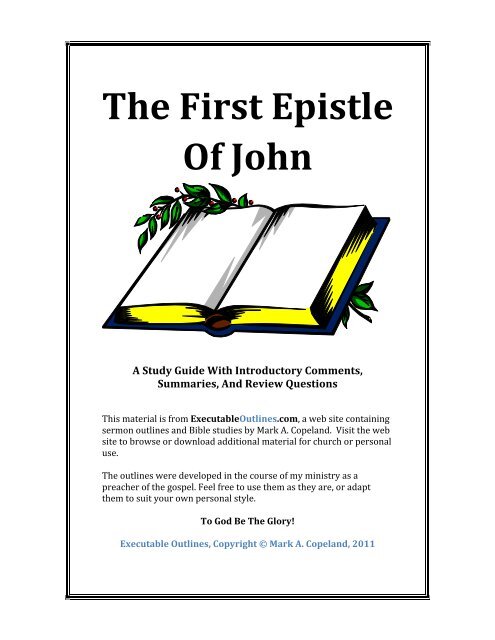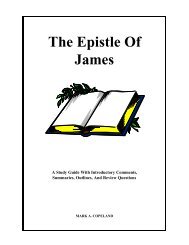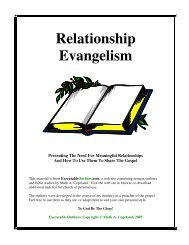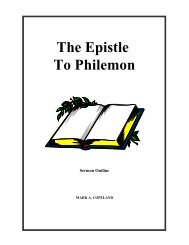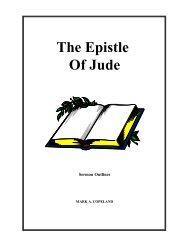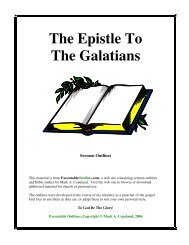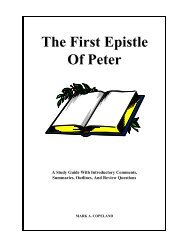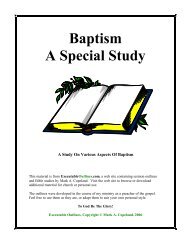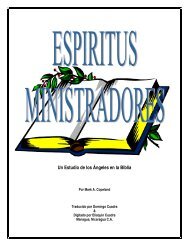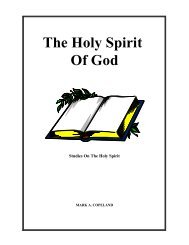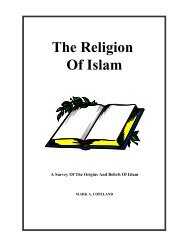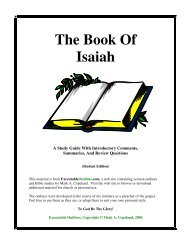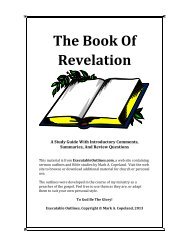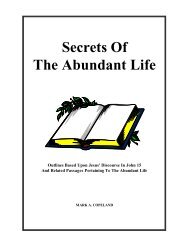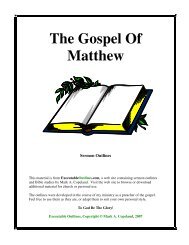PDF file - Executable Outlines
PDF file - Executable Outlines
PDF file - Executable Outlines
You also want an ePaper? Increase the reach of your titles
YUMPU automatically turns print PDFs into web optimized ePapers that Google loves.
The First Epistle Of John A Study Guide With Introductory Comments, Summaries, And Review Questions This material is from <strong>Executable</strong><strong>Outlines</strong>.com, a web site containing sermon outlines and Bible studies by Mark A. Copeland. Visit the web site to browse or download additional material for church or personal use. The outlines were developed in the course of my ministry as a preacher of the gospel. Feel free to use them as they are, or adapt them to suit your own personal style. To God Be The Glory! <strong>Executable</strong> <strong>Outlines</strong>, Copyright © Mark A. Copeland, 2011
The First Epistle Of John 2 Table Of Contents Introduction Chapter One Chapter Two Chapter Three Chapter Four Chapter Five 3 6 7 8 9 10 This study guide was designed for adult Bible classes, though it might be suitable for junior and senior high classes as well. Some have used it for personal devotions, and others in small study groups. • Points to ponder for each chapter are things I emphasize during the class. • Review questions are intended to reinforce key thoughts in each chapter. That you might know what answers were intended by the questions, I have included them in this guide. There is a “student edition” available with answers deleted. <strong>Executable</strong><strong>Outlines</strong>.com
The First Epistle Of John 3 Introduction When Jesus to earth, He came not only to live a life, but to give life: “I have come that they may have life, and that they may have it more abundantly.” -‐ Jn 10:10 The Gospel of John was designed to produce faith so that we might have life (Jn 20:30-‐31). However, it is The First Epistle of John which describes the nature of that life in greater detail (e.g., 1Jn 3:14). That we might be sure to live the sort of life God offers through His Son Jesus Christ, a careful study of The First Epistle Of John is in order. Author It is assumed in this study that the author is John, the beloved disciple of Jesus (Jn 13:23; 19:26-‐27; 20:2; 21:7,20). Similarities in style, vocabulary, and themes in both this epistle and the Gospel of John certainly offer internal evidence for this conclusion. There is also external evidence that John is the author. Polycarp, a close associate of John, appears to make reference to this epistle in a letter to the Philippians at the beginning of the second century. Irenaeus, a student of Polycarp, quoted from the epistle and attributed it to John. Recipients No one is specifically mentioned by name. John may have been in Ephesus at the time, and some think this was a general epistle to Christians throughout Asia Minor (modern day Turkey). Comments in 1Jn 2:20,27 could imply that John was addressing a specific group of Christians that possessed certain spiritual (miraculous) gifts. Date Estimates range from 60 A.D. to 100 A.D. Most modern scholarship places it around 95 A.D., but there are also good reasons for believing it was written prior to the destruction of Jerusalem in 70 A.D. (Re-‐dating The New Testament, John A. T. Robinson). Purpose And Theme In his epistle John frequently states why he was writing: • “these things we write to you that your joy may be full” -‐ 1Jn 1:4 • “these things I write to you, that you may not sin” -‐ 1Jn 2:1 • “these things I have written to you…that you may know that you have eternal life” -‐ 1Jn 5:13 • “these things I have written to you…that you may continue to believe in the name of the Son of God" -‐ 1Jn 5:13 While these reasons may state the positive purpose for John's letter, it appears he was also responding to errors prevalent at the time (“these things I have written to you concerning <strong>Executable</strong><strong>Outlines</strong>.com
those who try to deceive you” -‐ 1Jn 2:26). If not fully developed in John’s day, there was at least a precursor to Gnosticism. Those who later came to be called Gnostics claimed to have a superior knowledge (the Greek word for knowledge is gnosis). A fundamental presupposition was that all matter was evil. Therefore they believed that God did not create or have anything to do with the material universe (rather, it was created by a demi-‐god). Also, that Christ could not have come in the flesh (cf. 1Jn 4:1-‐3). One branch of Gnosticism, Docetism (dokein, “to seem”), taught that Jesus only seemed to be physical (contrast that with John’s statement in 1Jn 1:1). Cerinthus, a contemporary of John, taught that “Jesus” was physical, but that the "Christ" came upon Him at his baptism, and then left before His death, so that the "Christ-‐spirit" never suffered (cf. 1Jn 5:6). The Gnostics’ application to everyday living took two different directions. Since all matter was considered evil, some taught one should abstain altogether from anything that would satisfy the flesh. Others claimed it did not matter what one did in the flesh (it was evil anyway), and to have “full knowledge” it was proper to explore everything. John’s purpose therefore appears to be two-‐fold: • Assure Christians that they have eternal life (1Jn 5:13) • Counter those who denied that Jesus had come in the flesh (1Jn 4:1-‐6) As the theme of this epistle, may I suggest: Outline Eternal life is in Jesus Christ, who has come in the flesh Here is an outline of the book, from the Holman Illustrated Bible Dictionary… Prologue: The Word of Life (1:1-‐4) 1. God Is Light (1:5–3:10) a. Walk in the Light (1:5–2:2) 1) God is Light (1:5-‐7) 2) Resist sin (1:8–2:2) b. Obey the command to love (2:3-‐11) 1) Know God and keep His commands (2:3-‐6) 2) Learn the new command and love others (2:7-‐11) c. Know your spiritual status (2:12-‐14) d. Be warned of enemies of the faith (2:15-‐27) 1) Beware of the world (2:15-‐17) 2) Beware of the antichrists (2:18-‐27) e. Live like children of God (2:28–3:10) 1) Be confident and ready for His coming (2:28–3:3) 2) Be righteous and do not sin (3:4-‐10) 2. God Is Love (3:11–5:12) a. Love one another: part one (3:11-‐24) 1) Love in action (3:11-‐18) 2) Live in confidence (3:19-‐24) b. Test the spirits (4:1-‐6) 4 <strong>Executable</strong><strong>Outlines</strong>.com
c. Love one another: part two (4:7-‐21) 1) Love others because God loves you (4:7-‐10) 2) Love others because God lives in you (4:11-‐21) d. Obey God and experience the victory of faith (5:1-‐5) e. Believe in the Son and enjoy eternal life (5:6-‐12) Conclusion: Confidence and Characteristics of the Child of God (5:13-‐21) a. Know you have eternal life (5:13) b. Be confident in prayer (5:14-‐17) c. Do not continue in sin (5:18-‐20) d. Keep yourself from idols (5:21) Review Questions 1) Who is author of The First Epistle Of John? -‐ John the apostle, the beloved disciple who also wrote The Gospel Of John 5 2) Who were the original recipients of this epistle? -‐ Christians in general, likely in Ephesus or scattered throughout Asia Minor (Turkey) 3) When was it written? -‐ Most date it in 90s A.D. 4) List four reasons John stated for writing this epistle. (1:4; 2:1; 5:13) -‐ “that your joy may be full” -‐ “that you may not sin” -‐ “that you may know that you have eternal life” -‐ “that you may continue to believe in the name of the Son of God" 5) List another reason John wrote this epistle. (2:26) -‐ “Concerning those who try to deceive you” 6) What doctrine later found in Gnosticism is addressed in this epistle? -‐ Jesus Christ did not come in the flesh 7) What has been suggested as its two-‐fold purpose? -‐ Assure Christians that they have eternal life -‐ Counter those who denied that Jesus had come in the flesh 8) What has been suggested as its theme? -‐ Eternal life is in Jesus Christ, who has come in the flesh 9) What are the main divisions of this epistle as outlined above? -‐ Prologue: The Word of Life (1:1-‐4) -‐ God Is Light (1:5–3:10) -‐ God Is Love (3:11–5:12) -‐ Conclusion: Confidence and Characteristics of the Child of God (5:13-‐21) <strong>Executable</strong><strong>Outlines</strong>.com
The First Epistle Of John 6 Chapter One John begins his first epistle like he does his gospel: with a prologue regarding the Word of Life (Jesus Christ) who dwelt in the flesh among men and made fellowship with the Father possible (1-‐4). Fellowship with God is maintained as we walk in the light and confess our sins that we might enjoy continual cleansing through the blood of Jesus (5-‐10). Points To Ponder • The witness of John concerning the Word of Life • The nature of the evidence for faith in Jesus • The basis of our fellowship with God Review Questions 1) What are the main points of this chapter? -‐ Prologue: The Word of Life -‐ 1Jn 1:1-‐4 -‐ Fellowship with God -‐ 1Jn 1:5-‐10 2) How is John’s beginning in this epistle similar to his gospel? (1-‐4, cf. Jn 1:1-‐14) -‐ Both begin with a prologue regarding the Word who became flesh 3) How does John describe the pre-‐incarnation of Jesus? (1) -‐ As “that which was from the beginning” 4) What empirical evidence does John provide concerning the Word? (1) -‐ He has heard, seen with his eyes, handled with hands 5) What does John declare? What does he want to share? Why does he write? (2-‐4) -‐ Eternal life; fellowship with the Father and His Son; that our joy may be full 6) What message has John heard that he now declares to us? (5) -‐ That God is light and in Him there is no darkness at all 7) If we say we have fellowship with God but walk in darkness, what are we? (6) -‐ Liars who do not practice the truth 8) What do we enjoy as we walk in the light together with God? (7) -‐ Cleansing of all sin by the blood of Christ 9) What if we say that we have no sin? (8,10) -‐ We deceive ourselves, make God a liar, His word and the truth are not in us 10) What’s required to be forgiven of sin and cleansed of all unrighteousness? (9) -‐ To confess our sins <strong>Executable</strong><strong>Outlines</strong>.com
The First Epistle Of John 7 Chapter Two We have an Advocate who is also the propitiation for our sins and to truly know Him we must keep His commandments (1-‐6), especially to love one another (7-‐11). Describing his original readers’ spiritual state (12-‐14), John cautions against loving the world and being deceived by antichrists (15-‐23), by letting truth abide in them and they in Christ (24-‐29). Points To Ponder • The true test of knowing Jesus as our Advocate and our propitiation • Things in the world we cannot not love • The identity of antichrists in the writings of John Review Questions 1) What are the main points of this chapter? -‐ Our Advocate and how we know Him -‐ 1Jn 2:1-‐6 -‐ A new commandment -‐ 1Jn 2:7-‐11 -‐ Their spiritual state -‐ 1Jn 2:12-‐14 -‐ Love not the world, beware of antichrists -‐ 1Jn 2:15-‐23 -‐ Let truth abide in you, and you in Christ -‐ 1Jn 2:24-‐29 2) How can Jesus be of aid to us when we have sinned? (1-‐2) -‐ He is our Advocate with the Father, and the propitiation for our sins 3) What are two proofs that we know Jesus and that we abide in Him? (3-‐6) -‐ Keeping His commandments and walking as He walked 4) What commandment is both “old” and “new”? (7-‐11) -‐ To love one’s brother (cf. Jn 13:34-‐35) 5) List three groups of people and how John describes their spiritual state. (12-‐14) -‐ Little children: forgiven of sins, and having known the Father -‐ Fathers: Having known Him (Jesus) who is from the beginning -‐ Young men: Strong, the word of God abides in them, have overcome the wicked one 6) What three things in the world should we not love? (15-‐17) -‐ The lust of the flesh (immorality) -‐ The lust of the eyes (materialism) -‐ The pride of life (self-‐importance) 7) What does John reveal about antichrist? (18-‐23) -‐ There will be many: whoever denies 1) Jesus is the Christ, 2) the Father and the Son 8) How can we be sure that we will abide in the Son and in the Father? (24-‐29) -‐ By abiding in the truth spoken from the beginning and practicing righteousness <strong>Executable</strong><strong>Outlines</strong>.com
The First Epistle Of John 8 Chapter Three John describes God’s wonderful love for us, how hope as His children should motivate us to pure lives. Righteous living should be expected when we know what sin is, that Christ came to destroy it, and that one truly born of God will not persist in sin (1-‐9). True righteousness includes loving one another, even as Christ loved us, which in turn gives us confidence and assurance that we are abiding in Him and are of the truth (10-‐24). Points To Ponder • God’s love for us, and our love for one another • The definition of sin, and the meaning of “does not sin” (6,9) • The outworking of love, and the assurance it gives of our salvation Review Questions 1) What are the main points of this chapter? -‐ Living as children of God -‐ 1Jn 3:1-‐9 -‐ Loving one another -‐ 1Jn 3:10-‐24 2) What should motivate us to live pure lives? (2-‐3) -‐ The hope that when God (Jesus?) is revealed, we shall be like Him 3) How is sin defined by John? (4) -‐ As lawlessness (“transgression of the law”, cf. KJV) 4) What is true of one who abides in Jesus? Who has been born of God? (6,9) -‐ Does not “sin” (“keep on sinning”, cf. ESV, NLT) -‐ Does not “sin” (“make a practice of sinning”, ibid.) -‐ Cannot “sin” (“keep on sinning”, ibid.) 5) What distinguishes children of God from children of the devil? (10) -‐ The former practices righteousness and loves the brethren 6) What serves as evidence that we have passed from death to life? (14) -‐ That we love the brethren 7) How do we know what true love is? How then should we love? (16-‐18) -‐ By the example Jesus set; sacrificially, in deed and truth 8) What gives us assurance and confidence that we are of the truth? (19-‐23) -‐ Loving one another and keeping His commandments, especially having faith in Jesus 9) How can we know that He abides in us and we in Him? (24) -‐ When we keep His commandments, and by His Spirit whom He has given us <strong>Executable</strong><strong>Outlines</strong>.com
The First Epistle Of John 9 Chapter Four John cautions his readers not to believe everyone who claims to be led by the Spirit, but to test them (1-‐6). He then exhorts them to manifest brotherly love in keeping with the character and example of God’s love as demonstrated in the sacrifice of His Son (7-‐21). Points To Ponder • Distinguishing the spirit of truth from the spirit of error • How God’s love should impact our love for one another Review Questions 1) What are the main points of this chapter? -‐ Test the spirits -‐ 1Jn 4:1-‐6 -‐ God is love -‐ 1Jn 4:7-‐21 2) Why should one not believe every spirit? (1) -‐ Because there are many false prophets 3) If one is truly led by the Spirit of God, what will they confess? (2) -‐ That Jesus Christ has come in the flesh 4) What did John say about the coming of Antichrist? (3) -‐ It was already in the world at the time John was writing 5) What did John write about their ability to overcome? (4) -‐ He who is in you is greater than he who is in the world 6) How does one discern between the spirit of truth and the spirit of error? (6) -‐ By whoever listens to the apostles (cf. 1Co 14:37; 1Th 2:13) 7) Why should we love one another? (7-‐8) -‐ Love is of God, and everyone who loves is born of God and knows God 8) How was God’s love for us manifested? (9-‐10) -‐ By sending His Son into the world to be the propitiation for our sins 9) How can we ensure that God will abide in us? (12-‐16) -‐ By loving one another 10) When we love one another as we should, what does it give us? (17-‐18) -‐ Boldness in the day of judgment; i.e., no fear 11) If we claim to love God, but hate our brother, what does that make us? Why? (20) -‐ Liars; if we do not love someone we’ve seen, how can we love Him we’ve not seen? <strong>Executable</strong><strong>Outlines</strong>.com
The First Epistle Of John 10 Chapter Five John writes of faith in Christ, loving God, and overcoming the world (1-‐5). He then reviews God’s witness that gives us certainty regarding eternal life in Christ (6-‐13), and concludes with teaching on prayer (14-‐17) and the sure knowledge found in the Son of God (18-‐21). Points To Ponder • The importance of faith, love, and obedience • The nature of eternal life as a present possession • Sin which does not lead to death versus sin which does lead to death Review Questions 1) What are the main points of this chapter? -‐ Faith, love and obedience as children of God -‐ 1Jn 5:1-‐5 -‐ The sureness of God’s testimony -‐ 1Jn 5:6-‐13 -‐ Confidence and compassion in prayer -‐ 1Jn 5:14-‐17 -‐ Concluding remarks -‐ 1Jn 5:18-‐21 2) To be born of God, what is absolutely necessary? (1) -‐ Believing that Jesus is the Christ 3) How can be sure that they love the children of God? (2) -‐ When they love God and keep His commandments 4) How can one overcome the world? (4-‐5) -‐ Being born of God and believing that Jesus is the Son of God 5) What three things bore witness concerning Jesus Christ? (6-‐8) -‐ Water (Jesus’ baptism?), blood (Jesus’ death?), the Holy Spirit 6) What does one receive as they believe in the Son of God? (10) -‐ The witness in himself (cf. Jn 7:17) 7) What has God give us? Who has this? (11-‐12) -‐ Eternal life; he who has the Son 8) Why did John write these things in his epistle? (13) -‐ That we might know that we have eternal life, and continue to believe 9) What confidence do we have in prayer? (14-‐15) -‐ That if we ask anything according to His will, He hears us 10) What is described as the true God and eternal life? (20) -‐ To know Him who is true, and that we are in Him who is true, in His Son Jesus Christ <strong>Executable</strong><strong>Outlines</strong>.com


